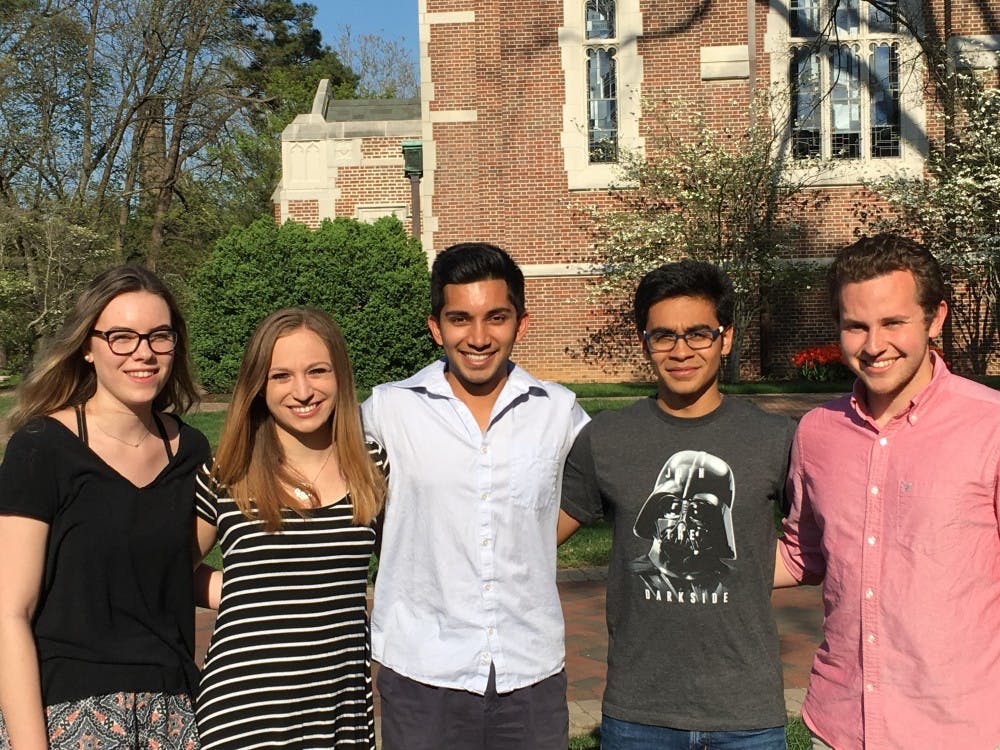Last Wednesday afternoon, five students in Boatwright Memorial Library gathered in a seminar room and began to move the tables aside so they could arrange the chairs in a “circle of trust."
Then they opened up the room to any students who wanted to come in and seek help.
These five students are part of the Peer Wellness Coaching program, a team of trained students who are available to provide confidential support, stress-management techniques and mental-health resources to other students.
Soleil Shah, RC ’17, who came up with the idea for the program, said it had started out as a second option for students who couldn’t get an appointment with Counseling and Psychological Services, but it had since evolved.
“Peer Wellness Coaches (PWCs) can be for any student who just feels a little overwhelmed with different aspects of his or her life,” Shah said.
There are four PWCs who take part in the Peer Wellness Coaching session: Shah, Zoe Rydzewski, WC ‘18, Gibran Merchant, RC ’20, Stephen Kapostas, RC ’20 and Lauren Costello, WC '19. Shah recruited Rydzewski and Merchant to help get the program started. Kapostas and Costello were the first PWCs added after it was created.
"The idea behind PWC is that students go to CAPS to address their mental-health issues with a licensed professional," Kapostas said. "But we wanted to give students the option to talk with people their age who are also going through similar things."
PWC counseling sessions follow a question-guided approach that has been used at Ohio State University. A student seeking help will sit in the “hot seat,” which is placed within a circle of chairs. The PWCs sitting around the student will ask a set of guiding questions about his or her problem. Then, a PWC will summarize what the student has said, repeat it back to them, and ask the student what small steps can be taken to help his or her solve the problem.
Slade Gormus, a registered nurse at the Student Health Center and an adviser for the PWCs, also sits in on each session as a resource. Gormus is a trained wellness coach who has helped the PWCs with implementing the program, as well as training.
“Sometimes things get so overwhelming that you aren’t quite sure how to get a hold of everything,” Gormus said. “You have the answers, but you just need to know which tools from your tool belt to use.”
The PWCs are currently working on ways to expand their program. They want to create a pamphlet on how to train peer coaches based on their experiences and work with the Student Health Center and CAPS on referring students to the PWCs. They are also taking applications for new PWCs.
Shah said he was trying to expand the PWC model to other schools in Virginia, including Virginia Commonwealth University and James Madison University.
Enjoy what you're reading?
Signup for our newsletter
“A broader goal is to create a culture of openness over mental-health issues,” Shah said. “A lot of people are hesitant to be open about that or talk to their peers, but their peers are the ones who have the most influence on every behavior.”
At the first official PWC appointment, no students showed up to seek help. Rydzewski said it could be difficult at first for students to feel comfortable sharing personal information with their peers.
“We are a fully confidential service," Rydzewksi said. "When we are in that room with you, we aren’t like your friends or a random student. We are peer coaches in there, and that’s a separate identity than who we are outside."
Contact contributor Stephanie Hagan at stephanie.hagan@richmond.edu.
Support independent student media
You can make a tax-deductible donation by clicking the button below, which takes you to our secure PayPal account. The page is set up to receive contributions in whatever amount you designate. We look forward to using the money we raise to further our mission of providing honest and accurate information to students, faculty, staff, alumni and others in the general public.
Donate Now



